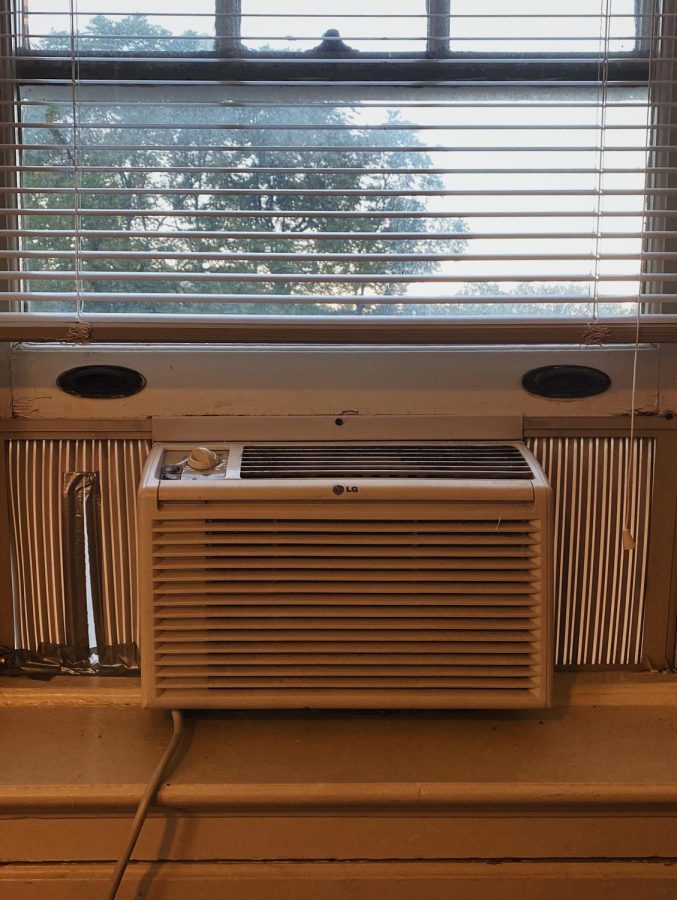Chatham has issues with heating and air conditioning
October 14, 2022
Chatham University students just can’t catch a break this semester. From the sweltering heat to the frigid cold, there is seemingly no end to temperature issues on campus.
Since move-in day in August, students have been subjected to temperatures as high as 97 degrees and as low as 43 degrees.
At Chatham, air conditioning units are not allowed in apartments and dorms without medical accommodations. The process for obtaining one requires students to go to their doctors and have them provide paperwork explaining the medical need for an air conditioner. If it is approved, Residence Life has one installed.
All students should have air conditioning, regardless of medical need. Students should not have to get their doctors to sign anything just so they can live comfortably in warmer months.
Requiring medical accommodations introduces many issues for some students. They must disclose medical issues to the University, which they may not be comfortable doing, and their doctors must be available to sign the paperwork. Students also have to write a medical cover letter explaining why they must have the air conditioning unit. This is done every time the students move on campus.
Caitlynn Taylor ‘23 believes it is unreasonable to expect students to refile every time they move.
“If you are a recurring student, they could at least keep it on file. I think that would make it easier on us, especially just because having to get a hold of our doctor and then have them fill out all the paperwork, if they don’t have the time to, then it’s a difficult process,” Taylor said.
It seems ridiculous that students with chronic conditions must prove they continue to have a chronic condition.
Timothy Creamer ‘24 has to apply every semester to get an air conditioner, but one semester his friend moved in and found an air conditioner in his apartment without applying for it. It was never removed. The issue here is not that students are getting air conditioning without a medical accommodation – it’s that students are required to have a medical accommodation at all.
“For a lot of people, they can’t really comfortably study, live or do anything in their apartments or dorms,” Creamer said about the heat.
It took around two to four weeks for an air conditioner to be put in Creamer’s apartment for his asthma. Students can apply prior to school, but for reference, move-in day was Aug. 24 and the high for that week was 97 degrees.
If you have a medical condition that is triggered by hot temperatures, those two to four weeks could be the difference between a smooth transition to school and seizures. That is the reality for Taylor, who has temporal lobe epilepsy.
It got hot enough in Taylor’s apartment that she woke up in a sweat during the night.
Students can’t install their own window air conditioning unit because of Chatham’s strict rules.
While it would be costly to add air conditioning to every dorm and apartment and it would require more energy, the process is worth it to avoid these issues.
If students are providing Chatham with money to live on campus, the onus should be on the University to invest in sustainable energy to power air conditioning, not on students to buy fans. Expecting students to live in boiling apartments for the sake of saving money on utility bills or renovations comes off as stingy and cruel.
Taylor and Creamer remarked that heating has had its own set of issues since it was turned on. Both of them had faulty knobs on their radiators that prevented them from changing the temperature. Taylor had to get a wrench to turn the rusty knob, and Creamer had a broken one since move-in day.
On Sept. 29, Maintenance started the weeklong process of turning the boilers on. Students had to deal with lows of 40 degrees as early as Sept. 4. This goes beyond timing; Chatham needs a better system for heating and cooling that doesn’t require a week to heat and a medical accommodation to cool.
“There’s no perfect temperature that we get here. You’re either sweating or you’re freezing,” Taylor said.
And for the students who moved to Chatham this semester: yes, this is Pittsburgh weather, but it shouldn’t be Chatham weather.







